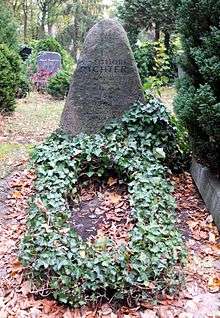Liselotte Richter
Liselotte Richter (7 June 1906, in Berlin – 16 January 1968, in Berlin) was a German philosopher and theologian. She was the first female professor for philosophy in Germany.
Liselotte Richter studied philosophy, theology and German studies in Berlin, Marburg and Freiburg from 1926 to 1932. Among her professors were Martin Heidegger, Edmund Husserl, and Erich Frank. She did her doctorate with Erich Frank in 1932. Her special interest lay in the writings of Sören Kierkegaard.
Academic activity

During the National Socialism, Liselotte Richter worked in the company Leibniz-Edition of the Prussian Academy of Sciences and worked from 1943 to 1945 as a nurse of the German Red Cross.[1][2] After the Second World War, she became "Bezirksstadträtin" for education and culture in Charlottenburg, habilitated at the Humboldt University in Berlin, and was the first woman in Germany that had a professorship for (pure) philosophy in 1948.[1][2] As part of the transformation of the Philosophical Seminar (2nd University Reform 1950/51) in the GDR, Liselotte Richter was forced from the Faculty of Arts 1951 and praised to the Faculty of Theology of Humboldt University.[1] She received a professorship with a chair for the philosophy of religion - as the first female scientist in Germany.[1] Her chair belonged to the subdivision Systematic Theology in the faculty.[1] She lectured on the history of philosophy and devoted herself to religious studies.[1]
In 1965, she received an honorary doctorate from the Faculty of Theology for her dedicated teaching.[1] Her writings reflect a diverse interest. In addition to Sören Kierkegaard, there are also publications on René Descartes, Jakob Böhme, Gottfried Wilhelm Leibniz, Moses Mendelssohn, Angelus Silesius, Rainer Maria Rilke, Karl Jaspers, Albert Camus, Jean-Paul Sartre, and Mahatma Gandhi. She commuted between her place of residence in the West Berlin (Charlottenburg) and the place of work East Berlin, and she continued her teaching even after the Wall was built.[1] After a long illness, she died on January 16, 1968 and was buried at Luisenfriedhof II in Berlin-Westend.[1] Her grave is dedicated as a grave of honor (German: Ehrengrab) of the city of Berlin.
The Theological Faculty of the Humboldt University in Berlin honored Liselotte Richter for her 100th birthday with a commemoration on June 7, 2006. Richard Schröder, Catherina Wenzel, and Michael Weichenhan wrote the commemorative volume „Nach jedem Sonnenuntergange bin ich verwundet und verwaist.“ Für Liselotte Richter zum 100. Geburtstag.[3] From 2007 to 2013, the Leibniz-Edition Potsdam of the Berlin-Brandenburg Academy of Sciences and Humanities awarded the Liselotte Richter Prize, which was endowed with 1,000 euros, to the upper secondary schools of the federal states of Berlin and Brandenburg.[4]
Selected publications
Monographies
- Der Begriff der Subjektivität bei Kierkegaard. Ein Beitrag zur christlichen Existenzdarstellung. Triltsch, Würzburg 1934 (at the same time: Marburg Univ. Diss.)
- Immanenz und Transzendenz im nachreformatorischen Gottesbild. Vandenhoeck & Ruprecht, Göttingen 1955
- Jakob Böhme. Mystische Schau. (Geistiges Europa). Hoffmann & Campe, Hamburg 1947
- Jean-Paul Sartre. (Köpfe des XX. Jahrhunderts; 23). Colloquium-Verlag, Berlin 1964
- Leibniz und sein Rußlandbild. Akademie-Verlag, Berlin 1949
- Mahatma Gandhi. (Köpfe des XX. Jahrhunderts; 25). Colloquium-Verlag, Berlin 1962
- Philosophie der Dichtkunst. Moses Mendelssohns Ästhetik zwischen Aufklärung und Sturm und Drang. Chronos-Verlag, Berlin 1948
- René Descartes. Dialoge mit deutschen Denkern. (Geistiges Europa). Hoffmann & Campe, Hamburg 1949
- Schöpferischer Glaube im Zeitalter der Angst. Glock, Wiesbaden 1954
As an editor
- Albert Camus: Der Mythos von Sisyphos. Ein Versuch über das Absurde. Rowohlt, Reinbek bei Hamburg 1959 [u. ö. bis 1997], ISBN 3-499-22198-5 (with the essay Camus und die Philosophen in ihrer Aussage über das Absurde von Liselotte Richter, which is not included in the new translation from 1999.)
- Sören Kierkegaard: Werke. Europäische Verlagsanstalt, Hamburg (with the essay Zum Verständnis des Werks)
- Der Begriff Angst. 1996, ISBN 3-434-46021-7.
- Die Wiederholung. 2005, ISBN 3-434-46022-5.
- Furcht und Zittern. 1998, ISBN 3-434-46023-3.
- Die Krankheit zum Tode. 1995, ISBN 3-434-46024-1.
- Philosophische Brocken. 1992, ISBN 3-434-46025-X.
Sources
- Richard Schröder u. a. (Hrsg.): Nach jedem Sonnenuntergange bin ich verwundet und verwaist. Liselotte Richter zum 100. Geburtstag. Frank & Timme, Berlin 2006, ISBN 3-86596-088-X.
- Karl-Wolfgang Tröger: Liselotte Richter als Forscher- und Lehrerpersönlichkeit. In: Die Zeichen der Zeit. Volume 40, Issue 11, 1986, Pages 283–287.
- Karl-Wolfgang Tröger: Zur Geschichte des Spezialfaches Allgemeine Religionsgeschichte. In: Helmut Klein (Hrsg.): Zur Geschichte der Theologischen Fakultät Berlins. Humboldt-Universität, Berlin 1975, pages 577–579 (= Wissenschaftliche Zeitschrift der Humboldt-Universität zu Berlin Volume. 34, 1985).
- Catherina Wenzel: Von der Leidenschaft des Religiösen. Leben und Werk der Liselotte Richter (1906–1968). Böhlau, Köln 1999, ISBN 3-412-12198-3.
- "Liselotte Richter". Retrieved 21 January 2019.
References
- "Richter". www2.gender.hu-berlin.de. Retrieved 2019-01-21.
- "Liselotte Richter". Retrieved 21 January 2019.
- "Nach jedem Sonnenuntergange bin ich verwundet und verwaist" : Liselotte Richter zum 100. Geburtstag. Richter, Liselotte, Schröder, Richard, Wenzel, Catherina, Weichenhan, Michael. Berlin: Frank & Timme. 2006. ISBN 386596088X. OCLC 70249436.CS1 maint: others (link)
- "Liselotte Richter-Preis der Leibniz-Edition Potsdam der Akademie – Berlin-Brandenburgische Akademie der Wissenschaften". www.bbaw.de (in German). Retrieved 2019-01-21.